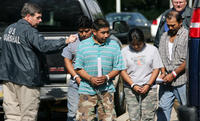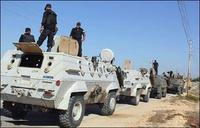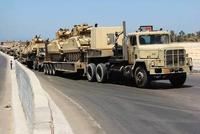-
Egypt under martial law; 525 die in clashes (updated)
The Egyptian government said 525 were killed, including 43 police officers, during clashes Wednesday between Egyptian security forces and supporters of the Muslim Brotherhood as the Egyptian police and army moved to clear two sit-in camps in which supporters of Mohammen Morsi had been barricading. The Egyptian government has declared a month-long state of emergency throughout the country. The main features of the state of emergency include a curfew which would run from 7:00 p.m. until 6:00 a.m. in eleven of Egypt’s twenty-seven provinces, including Suez, heavy presence of military units in cities and towns, and restrictions on movement and travel.
-
-
Egypt declares month-long state of emergency; hundreds die in clashes
About 150 Egyptians were killed during the early hours of Wednesday in clashes between Egyptian security forces and armed supporters of the Muslim Brotherhood as the Egyptian police and army moved to clear two sit-in camps in which supporters of Mohammen Morsi had been barricading. Well-organized Brotherhood supporters set police stations and government building on fire in several cities. Brotherhood followers also burned down the Alexandria public library and five churches. The Egyptian government has declared a month-long state of emergency throughout the country. The main features of the state of emergency include a curfew which would run from 7:00 p.m. until 6:00 a.m. in eleven of Egypt’s twenty-seven provinces, including Suez, heavy presence of military units in cities and towns, and restrictions on movement and travel.
-
-
Lawmakers, scientists question FBI’s investigation, conclusion in 2001 anthrax attacks

Twelve years after the fall 2001 anthrax attacks, and six years after the 2007 FBI’s determination that Bruce Ivins, a top government anthrax researcher at the U.S. Army Medical Research Institute of Infectious Diseases (USAMRIID), was the perpetrator of the attacks (Ivins died in 2008 of apparent suicide), lawmakers and USAMRIID scientists insist that the FBI’s conclusions are not supported by scientific evidence – indeed, that some basic scientific facts make the Bureau’s conclusions untenable.
-
-
U.S. nuclear facilities vulnerable to terrorist attack: study

Some U.S. nuclear facilities are inadequately protected against theft of weapons-grade materials and sabotage by terrorists. Terrorist attacks on vulnerable nuclear facilities could trigger a meltdown or lead to a diversion of bomb-grade uranium. The danger is far from hypothetical since the 9/11 hijackers are known to have considered flying a passenger jet into a U.S. nuclear reactor before they settled on the World Trade Center as their main terror target.
-
-
The administration does not follow its own deportation criteria

The Obama administration has set a record for deporting illegal immigrants, but the administration’s declared policy is to concentrate on criminals and other illegal immigrants who pose a risk. Yet, the administration has also been deporting immigrants who are not top priority according to the administration’s own criteria, and who may be eligible for legal residency if Congress reforms immigration law.
-
-
Imported food: Shifting from catching problems at the border to preventing them at the source
The Association of Food and Drug officials (AFDO) has published its guidance document for improving imported food safety. The document, entitled “Issues and Concerns with Imported Foods,” was released ahead of the U.S Food and Drug Administration’s (FDA) release of two rules on the same issue. The FDA aims to shift from a regulatory system that focuses on catching problems at the border and into a prevention system to correct issues before they reach the American border.
-
-
Federal judge: NYPD stop-and-frisk policy violates 4th, 14th Amendments (updated)

In a scathing, 195-page decision, a federal judge repudiated one of the major pillars of Mayor Michael Bloomberg’s crime-fighting strategy, finding that the NYPD’s stop-and-frisk tactics violated the constitutional rights of minorities in New York. The NYPD stopped some 4.43 million between 2004 and mid-2012, with Blacks and Hispanics accounting for 88 percent of those stopped. The NYPD has explained the disparity by saying that it mirrored the disproportionate percentage of crimes committed by young minority men. Judge Shira A. Scheindlin, using harsh language, dismissed this rationale. “This might be a valid comparison if the people stopped were criminals,” Judge Scheindlin wrote, explaining that there was significant evidence that the people being stopped were not criminals. “To the contrary, nearly 90 percent of the people stopped are released without the officer finding any basis for a summons or arrest.” Rather, Judge Scheindlin found, the city had a “policy of targeting expressly identified racial groups for stops in general.” She added: “Targeting young black and Hispanic men for stops based on the alleged criminal conduct of other young black or Hispanic men violates bedrock principles of equality.” The judge ruled that the effectiveness of “stop and frisk” was irrelevant. “Many police practices may be useful for fighting crime — preventive detention or coerced confessions, for example — but because they are unconstitutional, they cannot be used, no matter how effective,” the ruling said.
-
-
Israel, Egypt escalate attacks on militants in Sinai Peninsula (updated)

The growing intelligence cooperation between Egypt and Israel was in evidence early Friday when the Israel Air Force (IAF), in coordination with the Egyptian military, used drone strikes to destroy ready-to-launch rockets and rocket launchers on Egyptian territory, killing five Egyptian militants in the process. The rockets were deployed on Thursday in a desert area near the town of Rafah, and were discovered by an Egyptian surveillance fly-over. On Saturday, the Egyptian air force attacked militant positions in the area, killing twelve Islamists.
-
-
Deteriorating Sinai Peninsula security situation poses problems for Israel, Egypt

The attacks on Islamist targets in northern Sinai — by Israel on Friday and by Egypt on Saturday — are but the latest evidence of a growing problem of militancy and terrorism in the Sinai Peninsula, a vast, hard-to-control, lightly populated area consisting of steep mountain ranges and a forbidding desert. The growing al Qaeda presence in the area, the continuing influence of Iranian arms smuggling networks, and the influx of foreign Jihadists make the deteriorating security situation in the peninsula a threat both to Israel and to Egypt. The stipulations of the 1982 Egypt-Israel peace treaty complicate to fight against the militants.
-
-
Safety engineers welcome Obama’s chemical facility safety Executive Order
The American Society of Safety Engineers (ASSE) said it supports President Obama’s Executive Order to improve federal agency coordination of U.S. chemical facility safety and security oversight. The ASSE notes that while the causes of each chemical incident are unique and require careful investigation to help ensure similar incidents do not reoccur, common to every incident are the often overlapping and sometimes confusing layers of regulatory responsibility over facilities where potentially harmful chemicals are produced or stored.
-
-
Small modular reactors (SMEs) a “poor bet” to revive U.S. nuclear renaissance: report
A shift to small modular reactors (SMRs) is unlikely to breathe new life into the troubled U.S. nuclear power industry, since SMRs will likely require tens of billions of dollars in federal subsidies or government purchase orders, create new reliability vulnerabilities, as well as concerns in relation to both safety and proliferation, according a report issued last week.
-
-
Immigration reform should consider families, social ties: study
Immigration judges should be allowed to consider a person’s family and social ties to the United States before ordering the deportation of legal permanent residents for minor offenses, says a new study. The study aso found that 98 percent of all deportees are sent to Latin America and the Caribbean even though people from those countries do not make up 98 percent of all immigrants.
-
-
Israeli drone strike, in coordination with Egypt, destroys militants’ rockets deployed on Egyptian territory
The growing intelligence cooperation between Egypt and Israel was in evidence earlier today (Friday) when the Israel Air Force (IAF), in coordination with the Egyptian military, used drone strikes to destroy ready-to-launch rockets and rocket launchers on Egyptian territory, killing five Egyptian militants in the process. The rockets were deployed on Thursday in a desert area near the town of Rafah, and were discovered by an Egyptian surveillance fly-over.
-
-
Obama administration renews drone campaign in Yemen
Responding to intelligence information about planned terrorist attacks by Al Qaeda in the Arabian Peninsula (AQAP), information which led to the closure of twenty-two U.S. embassies in the Middle East and North Africa and a travel warning issued by the Department of State, the Obama administration has launched a series of drone strikes in Yemen over the past ten days.
-
-
DHS tentatively grants asylum to seven Mexicans
DHS has tentatively granted asylum to seven Mexican immigrants. Some of the immigrants were previously living the United States illegally, but left and tried to re-enter as part of a protest against the U.S. deportation policies, and in support of granting citizenship to immigrants who were to the United States as children.
-
More headlines
The long view
Factories First: Winning the Drone War Before It Starts
Wars are won by factories before they are won on the battlefield,Martin C. Feldmann writes, noting that the United States lacks the manufacturing depth for the coming drone age. Rectifying this situation “will take far more than procurement tweaks,” Feldmann writes. “It demands a national-level, wartime-scale industrial mobilization.”
No Nation Is an Island: The Dangers of Modern U.S. Isolationism
The resurgence of isolationist sentiment in American politics is understandable but misguided. While the desire to refocus on domestic renewal is justified, retreating from the world will not bring the security, prosperity, or sovereignty that its proponents promise. On the contrary, it invites instability, diminishes U.S. influence, and erodes the democratic order the U.S. helped forge.
Fragmented by Design: USAID’s Dismantling and the Future of American Foreign Aid
The Trump administration launched an aggressive restructuring of U.S. foreign aid, effectively dismantling the United States Agency for International Development (USAID). The humanitarian and geopolitical fallout of the demise of USAID includes shuttered clinics, destroyed food aid, and China’s growing influence in the global south. This new era of American soft power will determine how, and whether, the U.S. continues to lead in global development.
Water Wars: A Historic Agreement Between Mexico and US Is Ramping Up Border Tension
As climate change drives rising temperatures and changes in rainfall, Mexico and the US are in the middle of a conflict over water, putting an additional strain on their relationship. Partly due to constant droughts, Mexico has struggled to maintain its water deliveries for much of the last 25 years, deliveries to which it is obligated by a 1944 water-sharing agreement between the two countries.
How Disastrous Was the Trump-Putin Meeting?
In Alaska, Trump got played by Putin. Therefore, Steven Pifer writes, the European leaders and Zelensky have to “diplomatically offer suggestions to walk Trump back from a position that he does not appear to understand would be bad for Ukraine, bad for Europe, and bad for American interests. And they have to do so without setting off an explosion that could disrupt U.S.-Ukrainian and U.S.-European relations—all to the delight of Putin and the Kremlin.”
How Male Grievance Fuels Radicalization and Extremist Violence
Social extremism is evolving in reach and form. While traditional racial supremacy ideologies remain, contemporary movements are now often fueled by something more personal and emotionally resonant: male grievance.
